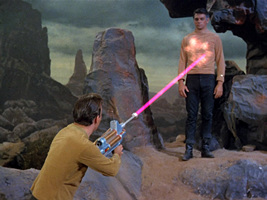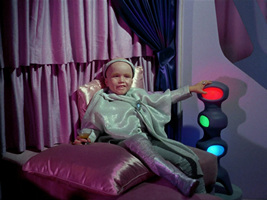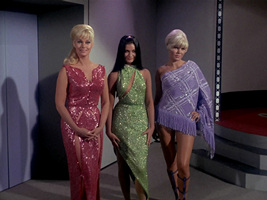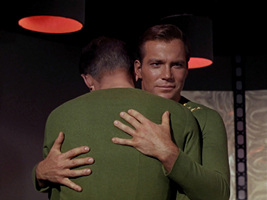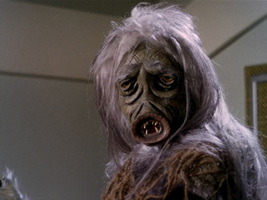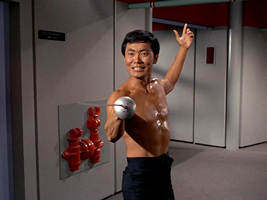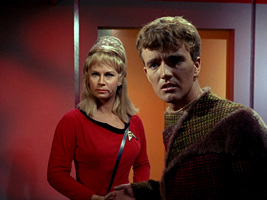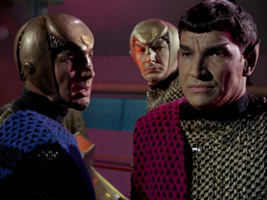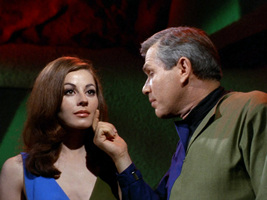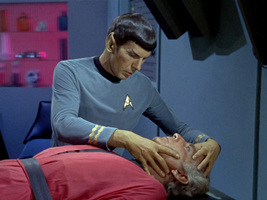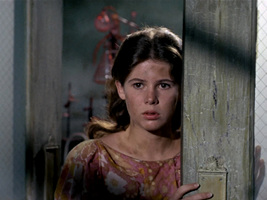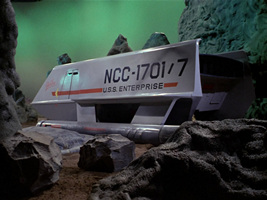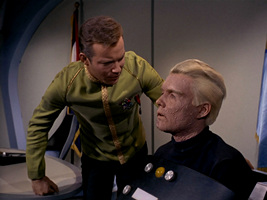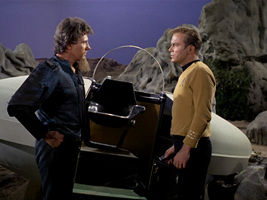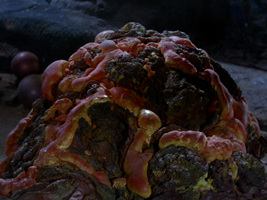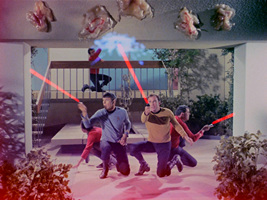The Original Series (TOS) Season 1 Guest Reviews
The Cage
Synopsis
Stardate not given: Captain Christopher Pike is captured by the remnants of a telepathic race, who can create and project powerful illusions. They attempt to salvage their society by creating a slave race of humans to rebuild their cities which were destroyed countless centuries earlier in a devastating war.
Review
"The Cage" is a very unique episode of Star Trek in that not only was it the very first episode ever made, but it belongs to a befated 'one episode' series, Science Officer Spock being the only character to survive NBC's revisions. Though the story itself is very interesting and thought provoking I can't help but wonder what Star Trek would have been like if the series had continued with these characters. Captain Christopher Pike is, in my opinion, an even more interesting character than Captain Kirk, though this is partly due to the excellent novel 'Burning Dreams' by Margaret Wander Bonanno that I think this. Nonetheless, its an episode worthy of the later "The Menagerie".
Annotations
- Contradictions: Star Trek was brand new and as a result the writers had not yet worked out all of the terminology.
- Remarkable quote: "Engage!" (It's the first time it's said.)
- Remarkable prop/ship: The USS Enterprise NCC-1701
Rating: 7 (Craig L Flint)
The Cage
Synopsis
Stardate not given: See EAS review
Review
As a fan of Trek history, I am always fascinated (no pun intended) with what went into the series and how it all began. "The Cage", for me, is my favorite TOS episode, and one of my favorite of all the shows. Personally, I think Roddenberry's original idea for Star Trek in 1964 and 1965 is very interesting. Particularly, the fact that the Federation does not exist (it's all Earth), the idea that the conventional Trek universe was not established, allowing for any number of possibilities, and mostly the minor things like Time Warp, table-top lamp-like view screens, and Spock smiling.
Recently, I began writing some fan-fiction stories about if the original Pike Trek was turned into a series instead of Kirk Trek, and the possibilities are endless.
Annotations
- Remarkable characters: Spock is not yet emotionally cold, and smiles frequently. - Majel Barrett was originally given the role of Number One because, at the time, she was having an affair with Roddenberry.
- Remarkable quotes:
- "Some people will tell their bartender things they'd never tell their doctor. How about a dry martini." -Dr. Boyce to Pike
- "You bet I'm tired, you bet! I'm tired of being responsible for 203 live, tired of deciding who goes with the landing party and who doesn't, and who lives....and who dies." -Pike to Boyce, on his captaincy.
- Remarkable costume: The pig-monster that the main Talosian turns into as Pike is strangling him was originally a costume from The Outer Limits.
- Remarkable alien: This is the first appearance of the Orion Slave Girl.
- Remarkable fact: In Gene Roddenberry's original 1964 series pitch, the captain was Robert M. April, the ship was the S.S. Yorktown, there was no transporter, the crew had bullet-firing weapons, and Spock was half Martian.
Rating: 10 (David Borgos)
The Cage
Synopsis
Stardate not given: a long time before Captain Kirk took command of the Enterprise it is captained by Captain Pike, and we don't know everyone else on the ship but Spock. The Enterprise goes to another planet to find a missing spaceship and when they land there Captain Pike is taken by some aliens who want to use his brain to make illusions and they want him to have kids. To do that, they make him fall in love with someone named Vina, who also crashed on the planet. Together the two of them try to escape from Talos 4!
Review
ENGAGE! It's THE CAGE! The first ever episode of Star Trek, even though Enterprise is set before it, this one was the first one made. It's weird how different it is from normal Star Trek, but also so the same in lots of ways, the message behind it is the Star Trek spirit! I found it kind of boring in the middle but the beginning and the end was great and some of the best parts of Star Trek I think. My favorite part was when they zoom in on the Enterprise, a lot of the episode looks fake and old but that scene still looks good today! And I like the new or old characters, and the aliens are both funny and scary. It's weird how Spock smiles but this was back when he was supposed to be a Martian or just an alien instead of a Vulcan, so it makes sense that way. Instead of Kirk, we have Pike, and he's really boring in this one, but the other crew are awesome. Dr. Boyce gives speeches, but doesn't do anything else. Number One is an awesome person and so is Yeoman Colt and of course Mr. Spock. I don't know who the other crew are but I can't wait to see them on Discovery! Still, if anything is Star Trek it is this, and I wish there had been more episodes like this with the Talos aliens and Pike's adventures, I want to find out more about that battle at the pretty castle and about the Columbia spaceship and what happened to Vina.
Annotations
- Remarkable errors:
- Spock smiles and yells a lot.
- The Enterprise has blue stars and goes back in time with a "Time Warp". Its also called a "Hyperdrive".
- Remarkable prop/ship/set: The Enterprise is less colorful than usual, it looks more real.
Rating: 7 (ivy)
The Cage
Synopsis
Stardate not given: Synopsis in main TOS listing
Review
I really like the original pilot episode of Star Trek. It was too good and ahead of its time too. Shame we didn't get to see more adventures of Captain Pike and crew thanks to NBC wanting changes to be made to the series. Thankfully, Mr. Spock remained.
I've often wondered just what were the mental limitations were of the Talosian race? What if Star Trek...all of Star Trek is nothing more that a Talosian illusion? Imagine that for a moment.
I like how this episode was later salvaged as a two part episode later on. At times "Number 1" seems more like how Spock would behave in later shows. I guess we can safely assume her logical influence had a lasting impression on Spock.
Vina was so alluring too in her different roles as she attempts to seduce Pike during those Talosian fantasies. An absolute classic!
Annotations
- Remarkable scene: Mr. Spock smiles. Fascinating.
- Remarkable prop: Lasers and transparent communicators
Rating: 9 (R.D. Lewis)
Where No Man Has Gone Before
Synopsis
Stardate 1312.4: After receiving a distress call from the long missing S.S. Valiant, the Enterprise goes through the Galactic Barrier, at which time Kirk's friend Gary Mitchell and Doctor Elizabeth Dehner acquire amazing mental powers which present a danger to the Enterprise. Captain Kirk is presented with two options from Spock: kill Mitchell while he still can or maroon him on the mining colony Delta Vega. Kirk, of course, chooses the latter and sets the Enterprise's course to the planet, where the crew will also attempt to repair the ship's damaged warp engines. Once on Delta Vega, Mitchell is locked up but soon escapes and Captain Kirk has to go after him with a phaser riffle. When Kirk finds Mitchell he discovers that his phaser has no effect on him and just by the grace of Doctor Dehner's remaining humanity is he able to stop and kill Mitchell.
Review
"Where No Man Has Gone Before" was definitely an attempt to create a more "action" oriented pilot. Captain Kirk was also created with this in mind to replace the more sedate Captain Pike. It is here that Kirk gets his first trademark "torn shirt". I enjoyed the action scenes but the episode lacked a good thought provoking story.
I thought that "Where No Man Has Gone Before" was more exciting than "The Cage", but then again I am partial towards a good action story. The episode contained a long drawn out fist fight between Captain Kirk and Gary Mitchell. The fighting was exciting, although it is painfully obvious that they used stunt doubles for those scenes.
I do have to give the actors a lot of credit for wearing those contact lenses. They look very painful. The episode also didn't have the full regular cast as Doctor McCoy was not present. The bridge set was also different and Spock's eyebrows were swept up more drastically than was the norm.
"Where No Man Has Gone Before" is a good action story, but it is definitely not one of the best of "Trek" even in the action category, much less overall.
Annotations
- Remarkable error: The tombstone that Gary Mitchell creates for Captain Kirk reads "James R. Kirk". Either the show's writers had just assigned him a middle initial since they hadn't picked one out yet or Gary Mitchell didn't know Jim's middle initial. Either that or Gary was just delusional.
- Remarkable props: The three dimensional chess set first appears here and the very cool phase riffle never returns. I wish I had one of those babies!
Rating: 5 (Nathaniel)
Where No Man Has Gone Before
Synopsis
Stardate 1313.4: Synopsis in main TOS listing
Review
The second TOS pilot is a very engaging (no pun intended!) to watch. It has all the hallmark features of what would eventually define what TOS would become by the end of the first season. The script is more action oriented but does not get dragged down by that aspect.
Dr Dehner gets typically sexist treatment here. In the briefing room she is the only women amongst the bridge officers. She also gets her professionalism stripped out pretty quickly by calling Mitchell by his first name. In retrospect you can see how male and female roles are stereotyped (probably so the series would sell).
It's interesting to note that during the finale of the episode, when Dehner attacks Mitchell, her eyes go back to silver long before Mitchell's do... also if Mitchell cannot break the force field prison then why not break the wall down behind him instead? And why does Mitchell look so awkward when being 'god' it often looks like his body is in pain or he cannot move. Maybe the silver lenses meant that he could not see properly and had to stand still!
A good overall start to the series. The remaster does a good clean up job, although Delta Vega (IMHO) now looks like more like a picture, the unmastered version planet actually looks better.
A fine start and a great episode to watch to see how many things would change between the pilot and the series in full...
Annotations
- Remarkable error: The theme music in the original episode is not preceded by Shatner's narrative. In the remaster we get his "Space the final..." narrative.
- Remarkable music: The end titles have the original music score that was originally in the opening titles.
- Remarkable actor: Gary Lockwood also stars in "2001: A Space Odyssey". Sally Kellerman would be Hot Lips Houlihan in the 1970 film "MASH".
- Remarkable transporter: How does Mitchell remain standing on the transporter pad when he has been sedated?
Rating: 8 (Simon)
Where No Man Has Gone Before
Synopsis
Stardate not given: Synopsis in main TOS listing
Review
I may be one of the few fans out there that really like this episode. I found the second pilot to be fascinating in fact there's no aliens to be had. More of an exploration into humanity and what could happen when we're forced to evolve too fast and not knowing what to do with such new god-like powers. It would have been great had the Next Generation referenced this episode as I could imagine that the Q would be greatly concerned about a dangerous savage child-like race suddenly becoming nearly as powerful as them in such a short time.
Also it's interesting to note that the Enterprise had apparently gotten a refit not long after the events of this episode and the uniforms had changed.
Rating: 9 (R.D. Lewis)
The Corbomite Maneuver
Synopsis
Stardate 1512.2: The Enterprise encounters a warning buoy and, in order to protect themselves, the Enterprise crew must destroy it. However, this draws the attention of its mother-ship, a huge, extremely powerful vessel know as the Fesarius representing the "First Federation". The commander of the Fesarius, Balok, threatens to destroy the Enterprise but Kirk stalls for time claiming that if attacked, a substance contained on the ship know as "corbomite" will destroy the Fesarius as well. The bluff works and Kirk and a landing party beam over to the Fesarius where it is learned that the whole thing was a clever way for Balok to establish first-contact. A member of the landing party, Lt. Bailey, remains with Balok to establish relations with the First Federation.
Review
"The Corbomite Maneuver" is an entertaining and thrilling episode. Captain Kirk's strategic maneuvers are brilliant, especially his corbomite bluff. His bluff about that explosive is my second favorite Kirk bluff, next to "fizzbin" from "A Piece of the Action". Kirk would also use the corbomite bluff a second time to escape from the Romulans in "The Deadly Years".
This episode contains great suspense as we don't know if Balok will actually destroy the Enterprise after his deadline is up. Sulu's countdown was very well done as the camera pans from one character to another as time clicks away. Lt. Bailey's outburst of fear on the bridge is also great as he claims "He's already started a countdown!". This also adds to the tension as we don't know if Bailey will completely lose it and attack the captain or something.
However, the greatest part of this episode has to be the Fesarius and the very intimidating Balok "puppet". We figure Balok must be a very strong and intimidating figure but it turns out that he is just a baby.
Overall, "The Corbomite Maneuver" was a good episode that contained much action and suspense. A good episode considering this was the first episode filmed removed from the pilots.
Annotations
- Amazing ship: The Fesarius. Not only is she huge and extremely intimidating, she is also absolutely gorgeous!
- Amazing character: Balok is an interesting fellow. Him being like a baby is weird. I think I liked his puppet "alter ego" better.
Rating: 6 (Nathaniel)
Mudd's Women
Synopsis
Stardate 1329.1: The Enterprise captures Harry Mudd along with his "cargo", three beautiful women, after a short chase that burns out the ship's lithium crystals. The Enterprise goes to the mining colony on Rigel XII to replenish their supply of the crystals, but when they arrive the miners are only interested in "Mudd's women". Harry Mudd's luck runs out when his drug that makes the women beautiful is found out to be useless and the miners lose interest in the women and, as a result, give Kirk the lithium crystals.
Review
This episode has very little going for it, and those things are three beautiful women and Harcourt Fenton Mudd. Mudd makes the episode bearable to watch due to his great comedic talent. Roger C. Carmel (Harry Mudd) is successful in making the story laughable when it would otherwise be very serious. Mudd is one of the most fun and lovable "villains" in all of "Trek", although the idea of Harry Mudd harming anyone is completely laughable. The beautiful women also make the episode nice to look at, but the way they were used is completely despicable. The idea of women being "sold" to men as wives is extremely disgusting and the thought that this would happen in the 23rd century is really discouraging. One thing that was never made clear, however, was whether Harry really cared for the women or he just wanted to cash-in on his con scheme. If he did, then at least the women weren't just "merchandise" to him.
Kirk and Harry Mudd play off each other very well to create some very humorous scenes. The exchange at the end were Harry claims, "They would throw the key away!", was very amusing and was a good light note to end the episode on.
One problem that I have with the overall concept of the episode is the Venus drug. The idea that a pill could turn an ugly woman into a smoking hot babe in a matter of seconds is completely ridiculous. Worse yet, when Kirk replaces the drug with a gelatin capsule, it has the same effect on the women as the real drug. There is no way that these effects could be psychosomatic and therefore, this one fact completely undermines the entire concept of this episode.
In conclusion, only one thing saves this episode form complete disaster: Harry Mudd.
Annotations
- Remarkable uniform: Uhura wears a gold uniform in this episode for some strange reason.
- Remarkable dialogue:
- "I could be a character witness at your trial, if you think it would help." -Kirk
- "They would throw the key away!" -Harry Mudd
- Remarkable error: The crystals that regulate the matter/antimatter engine reactions is said to be made of "lithium". Since lithium really exists, it was later decided to change it to a fictitious material, "dilithium".
Rating: 2 (Nathaniel)
Mudd's Women
Synopsis
Stardate 1329.8: Synopsis in main TOS listing
Review
I almost skipped this one. But this episode did have its better moments. Harry Mudd was an enjoyable character if not a bit over the top at times. The reactions the women got from the some of the male crew members were funny too. Other than that, I didn't find much good here. Sort of boring and pointless with unlikable throwaway characters.
Thankfully, Mudd gets a better episode later in the series.
Annotations
- Remarkable quote: "Aye." - "Amen to that, Scotty."
Rating: 1 (R.D. Lewis)
The Enemy Within
Synopsis
Stardate 1672.1: A transporter mishap divides Captain Kirk into separate beings, one gentle, the other evil.
Review
Explores the 'duality of man'. It is an interesting commentary on the need for the harsh or brutish side of human nature in leadership and decision making (you can't please all the people all the time). Also shown is the value of self control and self discipline and its role in harnessing the inner drives to bring a balanced whole personality. Interestingly the negative Kirk was fearful. Evil Kirk's attack of Janice Rand makes the episode a bit scary.
Annotations
- Nitpicking: Spock shows emotion when he smiles at Janice Rand at the end.
- Remarkable quotes:
- "It's dead Jim" (McCoy for the first time)
- "If I seem insensitive Captain please understand, it's the way I am." (Spock)
- Remarkable scene: First use of Famous Vulcan Nerve Pinch
- Remarkable prop: Mr. Scott's horned poodle
Rating: 6 (Darrell Crisp)
The Enemy Within
Synopsis
Stardate 1672.1: A transporter malfunction separates Captain Kirk into two different individuals, one "good" and the other "evil". The malfunction strands Sulu and others on the planet below as Kirk races to catch his evil double and Spock tries to find a way to put the Kirks back together again. Kirk has a few physical confrontations with his double before Kirk is able to capture him and Spock, using the transporter, is able to put the Kirks back.
Review
Overall this episode is entertaining, although it does contain a few continuity errors. William Shatner does a fantastic job portraying the two polar opposite Kirks and making the "evil" Kirk at least somewhat believable. One problem I see with the problem of Sulu and the others being trapped on the planet is that the Enterprise could have just dispatched a shuttle. I know that the production team still didn't have an actual shuttle to use on screen, but the real Enterprise should still have had a shuttle anyway.
The scenes with the "evil" Kirk are somewhat disturbing. It is surprising to see how our nice Captain Kirk could be so savage, just like we will later see in "Mirror, Mirror". The scene in sickbay where Kirk demands the brandy and the scene where Kirk tries to rape Yeoman Rand are well done as to create the most tension and surprise.
This episode is one of my favorite "Star Trek" episodes for many of these reasons and is a good example what Captain Kirk is really all about.
Annotations
- Continuity error: In the teaser, both Captain Kirk and his double materialize without the Starfleet insignia on their chests and, before Kirk would have a chance to change uniforms, the insignia reappears.
- Another error: The scratches on the "evil" Kirk's cheek changes sides midway through the episode.
- Great acting: William Shatner's quick pivot on the transporter pad was a brilliant way to create mystery. Well done, Bill.
Rating: 9 (Nathaniel)
The Enemy Within
Synopsis
Stardate 1672.1: Synopsis in main TOS listing
Review
I like this one. A strange but different episode that really stands out from the rest. The evil Kirk almost behaved more like a Klingon than a human at times. Cunning, violent, and manipulative. Certainly a fun to see Kirk's darker side completely unbound. I also liked how Spock was the voice of reason during the crisis and believed that the Kirk he knew could never do things he was accused of when the evil Kirk was up to no good.
An underrated episode in my opinion.
Annotations
- Nitpicking: Did I miss something in why they couldn't send a shuttle down? Seriously. Seems like a huge plot hole here.
- Remarkable quote: "The... impostor had some... interesting qualities, wouldn't you say, yeoman?"
Rating: 6 (R.D. Lewis)
The Man Trap
Synopsis
Stardate 1513.1: The Starship Enterprise visits planet M-113 to deliver supplies and check up on archeologists Professor Robert Crater and his wife Nancy, who was previously romantically involved with Doctor McCoy. Almost immediately things become very mysterious as Enterprise crewmen begin turning up mysteriously dead, first on the planet and then on the Enterprise herself. At first, Dr. McCoy can find no apparent cause of death, although there is significant mottling of the skin on the victims' faces, but eventually determines that the victims have had all of the salt in their bodies mysteriously removed. As the mission progresses, Kirk and Spock learn from Professor Crater that what is causing the crew members' deaths is a "salt vampire", the last of its kind, which had killed Nancy Crater and taken her form. With the creature on board the Enterprise, able to assume any form, a manhunt begins. During the manhunt, Professor Crater turns up dead, killed by the salt vampire, and while it attempts to kill Captain Kirk, McCoy kills the creature with his phaser.
Review
Originally airing on September 8, 1966, "The Man Trap" was the first episode to air in the original network run of "Star Trek".
Since "The Man Trap" was filmed very early in production (sixth), a few details are inconsistent with the remainder of the series. For instance, Sulu is not the helmsman, he's a botanist, and, at the beginning of the show, Uhura appears at the conn (although it is later established in the episode that Uhura is indeed the communications officer). Further differences occur in the opening credits. Furthermore, the phasers have white handles and the sound effects are different for McCoy's medical scanners, as well as for the tricorder and turbolift. The communicators are also inconsistent with their sound effects. In "The Man Trap" sickbay is referred to as the "dispensary".
Series continuity is also lacking due to the fact that Spock states that Vulcan has no moon, which would later be contradicted by TMP. Spock is also shown to have a few emotions, although virtually none, but more than he would display later on in the series.
Despite the inconsistencies with series continuity, "The Man Trap" is an interesting episode that that combines many theatrical elements to create an interesting story. George Clayton Johnson, the writer of the story, does a fine job combining elements of mystery, suspense, and even a little bit of horror to create an interesting story that has a good climax; our fine country doctor protecting our brave captain with a phaser, despite the creature's appearance of his former love.
This episode also does a good job in giving us some insight into McCoy's character and provides some back-story to the lovable Dr. McCoy, or "plum", as Nancy used to call him.
The acting in "The Man Trap" was also good, especially the way all of the actors who portray the creature bit their knuckles to tell us that the "person" is actually the creature.
Overall I feel that "The Man Trap" is a fine example of "Trek" and that it set a good base from which the series would build on for the remainder of its run.
Annotations
- Crew losses: four. Crewman Darnell and Crewman Green are killed on planet M-113, Barnhardt is killed on deck nine, and Sturgeon, who was named after science fiction writer Theodore Sturgeon, who would later write "Shore Leave" and "Amok Time", was also killed on the planet. All were killed by the "salt vampire".
- Remarkable set: the botany lab, a re-dress of the sickbay set
- Amazing weapon: The laser gun that Professor Crater uses previously appeared on "The Cage" and "Where No Man Has Gone Before", and would later reappear in "What Are Little Girls Made Of?".
- Starfleet uniforms: Starfleet uniforms from the pilot episodes appear on extras here.
Rating: 7 (Nathaniel)
The Man Trap
Synopsis
Stardate not given: Synopsis in main TOS listing
Review
Well...it had its moments both good and bad. Nice idea of a salt sucking vampire that's the last of her kind just trying to survive. Strange how she went after human victims even when there was plenty of salt tablets available. Guess we just taste better. Had the creature showed some restraint, she may have just gotten away with leaving the planet with none being the wiser. I honestly didn't really care for the how she would often seduce her victims before the kill. I would've liked to see the creature use other methods to trick and drain her victims of their salt.
The final reveal of the creature's true form was a let down but interesting that she somehow stunned Kirk before feeding on him. Also she was astonishingly strong being able to take down Spock with a single backhand.
Annotations
- Remarkable prop: The old style laser pistol seen from "The Cage" makes an appearance, destroying a stone slab quite spectacularly.
Rating: 5 (R.D. Lewis)
The Naked Time
Synopsis
Stardate 1704.2: The Enterprise reaches planet Psi 2000 to observe that planet's break-up and to evacuate a science team on the planet. However, a landing party discovers the scientists dead after they appeared to have gone crazy. Unbeknown to the landing party, a virus transmitted through perspiration that causes an intoxicating effect had caused the deaths of the scientists and that Lt. Tormolen brought the virus back on board the Enterprise. The virus is quickly spread throughout the ship and some crew-members begin to show signs of the illness. One such victim, Lt. Riley takes over engineering and turns off the warp engines. Just as the planet's break-up continues to escalate, Scotty and Captain Kirk retake engineering and, with the help of the emotional Spock, are able to perform a cold-start of the engines, something thought to be impossible. The Enterprise escapes but discovers that due to the engine restart, they had traveled back in time. The crew had three days to live over again.
Review
"The Naked Time" is a good episode that does a fantastic job in developing the characters and providing insight into their inner-most desires. Writer John D.F. Black wrote a terrific story containing many gems including Sulu's swashbuckling and Kevin Riley's awful singing. The scene where Nurse Chapel professes her love for Spock was especially well done and was very emotional. Leonard Nimoy does a good job of acting in this segment in one of his very few opportunities to emote. Most of this credit is due to, in my opinion, director Marc Daniels. Daniels does a wonderful job in making the well written script a fantastically well acted and executed episode.
We learn here of Captain Kirk's great love for the Enterprise, although he also feels resentment for her as it prevents him from living a "normal" life. We also learn that Vulcans do indeed have emotions, very strong ones at that, but that they control them through logic, which is apparent when Spock attempts to remain in control through counting. We also see the birth of the "sling-shot" time travel effect. It would later be used in "Tomorrow Is Yesterday", which was originally to have been the second part to this episode, as well as "Star Trek III: The Search For Spock".
One of things that bugs me in this episode is how stupid Lt. Tormolen is for taking off his glove despite being told by Spock to be careful. How on Earth did this kid get on the Enterprise! Good grief! Also, Kirk beating Spock was troublesome. I mean, did Spock really need it. Well, maybe he did.
I did like David Hyde's portrayal of Lt. Kevin Riley. He creates an incredibly likable character , although his singing was horrendous, although I think that was the point, as I did create a wonderful line from Kirk: "Oh please, not again!"
"The Naked Time" is a wonderfully entertaining episode and has all of the elements I love in a Star Trek episode: mystery, suspense, humor, and action. This is a very memorable episode for many reasons and is an example of one of Trek's finest.
Annotations
- Remarkable quotes:
- "Oh please, not again!" -Kirk
- "I cannot change the laws of physics!" -Scotty
- Remarkable sequel: "The Naked Now", from The Next Generation, was based on this episode. Gene Roddenberry felt that a similar episode would be good for developing the show's new cast of characters.
Rating: 8 (Nathaniel)
The Naked Time
Synopsis
Stardate 1704.2: Synopsis in main TOS listing
Review
I got mixed feelings about this one. Sure, it's got some iconic moments like Riley singing and Sulu chasing people around with a sword. But honestly, I found this episode a bit too cheesy. Especially the part when there's a struggle with a butter knife. A mixed bag of goods to be sure.
But there was the cool moment when Scotty did a cold start to the warp engines that somehow caused the Enterprise to go into Time Warp. That part was part very unexpected and really interesting at least.
Annotations
- Remarkable quote: "Space still contains infinite unknowns."
- Remarkable fact: For whatever reason, a follow up episode was made on TNG's "The Naked Now".
Rating: 5 (R.D. Lewis)
Charlie X
Synopsis
Stardate 1533.6: Young Charlie Evans comes on board the Enterprise from the Antares on his way to a colony. Charlie was the lone survivor of a crash on planet Thasus and grew up there alone, so when he comes on board the Enterprise he is not socially adept to interact with the crew. Charlie immediately develops a crush on Yeoman Janice Rand, and soon becomes obsessed with her. When Charlie begins showing signs that he has incredible power, at first just harmless pranks, as well as showing little regard for others, and after he makes several crew-members "disappear", Captain Kirk becomes concerned. When Kirk learns that Charlie used his power to destroy the Antares and take control of the Enterprise, he decides something has to be done. He attempts to overtax Charlie's powers by turning all of the bridge controls on. Just as Charlie is about to do away with Captain Kirk, a floating green head that claims to be a Thasian appears to take Charlie back to their planet. Despite his pleas he returns with the Thasians to live out the remainder of his life on Thasus.
Review
Charlie Evans is a sick young man who has no concept of others and he doesn't seem to care. At first it just seems that he has no idea that what he does is wrong, but it soon becomes clear that he is crazy and uses his powers to exact his revenge on those he feels have not been "nice" to him. His crush on Yeoman Rand becomes very destructive and you fear Charlie is going to do something really bad. Things come to a head when he admits he just destroyed the Antares, killing all aboard. Worst of all, he seems to be fine with it and doesn't show any remorse. Captain Kirk tries to reason with Charlie but he is too far gone to be saved: he is a psychopath.
To a certain point, Charlie is acting just like every other 17 year old boy, but he has not had guidance on how to deal with his urges and emotions and he expresses them completely. It is too late for even Captain Kirk to do anything to help the young man. Captain Kirk tries to give advice that boy desperately needs to become a functioning member of society but I feel that he is too old to truly comprehend what Kirk is trying to tell him, although Kirk doesn't quite do the best job he could. Instead of talking about the physical and emotional aspects of adolescence, he rambles about what a man can't do to a woman and that he can't have everything he wants as well as take him to the gym and teach him fighting moves.
The only problem I have with the episode is that despite all of the tricks and the things that go on on the Enterprise, Charlie isn't suspected of having anything to do with it until at least half way through the episode. The fact that he survived on a desolate planet as a young child all by himself should automatically raise some red flags that there may be more to this kid than it seems.
Captain Kirk does his best to help Charlie and protect his ship and should be commended for his genuine caring for Charlie, although ultimately he has to let Charlie go to protect others.
This episode shows the darkest parts of a teenage boy's psyche and shows what most of us probably would act like if we didn't have our parents to teach us how we should act and how to control ourselves.
The episode was somewhat entertaining but lacked that certain element to make it a fine episode. The real lack of a good villain other than a kid who doesn't know the difference between right and wrong certainly plays a factor. This is more of an exploration into adolescence (which we have all gone through and learned more about than most of us would ever care to) than a true adventure story. I did however like Charlie's card tricks in the rec room and his emotional outburst at Spock for beating him at chess
Rating: 4 (Nathaniel)
Charlie X
Synopsis
Stardate not given: See EAS summary
Review
It was sort of Gene Roddenberry's mission statement to present serious messages through his episodes. "Charlie X" is one of the few moral/thematic plots of the season.
Charlie is a young man who stepped away from his all-male past and into a new world of self-discovery. But this is no ordinary 'Stranger in a Strange Land' story, this is about a teenage boy struggling to comprehend his changing mind and reconcile his conflicting emotions.
Even though EAS argues that the traditional gender roles presented in the episode degrade the plot, I think that they serve as a plot device meant to further alienate Charlie towards the opposite sex.
Overall, this is a great episode.
Annotations
- Remarkable appearance: Creator Gene Roddenberry makes a brief off-camera appearance as the voice of the Enterprise Chef. In his scene, he exclaims that the boxes of Thanksgiving meat loaf have been transformed into real turkeys.
- Remarkable quote: "Is that...a girl?" -Charlie
- Remarkable firsts: Uhura sings and Spock smiles.
- Remarkably cheap set: The wall that Kirk is thrown against in the gym suffers a small crack due to the impact, and can be seen on film.
- Remarkable fact: This was the first Star Trek episode that my mother remembers seeing--when it first aired in September 1966.
Rating: 8 (David Borgos)
Charlie X
Synopsis
Stardate not given: Synopsis in main TOS listing
Review
Not a particularly great episode. Upsetting really since Charlie was being raised by aliens and given powers to survive but wasn't told how to use his powers just for survival and not mischief. I feel Charlie was another victim of sorts, lacking a real family and human upbringing. It's really no surprise how he became such a problem on the Enterprise. The ending is sad too as Charlie is taken away from his own people rather than just being stripped of his powers or given the chance to learn discipline in not using them to harm others.
Overall, a very sad and depressing ride.
Rating: 3 (R.D. Lewis)
Balance of Terror
Synopsis
Stardate 1709.1: Synopsis in main TOS listing
Review
"The Enemy Below" in space, that is the basic outline for this episode which is still one of my favourite stories from TOS and Star Trek in general. There are just so many things that I enjoy about it. The episode starts off quiet and soft with the wedding ceremony only to change abruptly into something completely different. The Romulan commander is a more than worthy enemy for Kirk and the Enterprise and his discussions with the Centurion give us a rare insight into Romulan culture and their way of thinking. There are a lot of surprises and twists in the ongoing battle and the final statement of the Romulan commander before he self-destructs his ship is one of the greatest moments in Star Trek. The only annoyance is the character of Lt. Stiles but he does not play such an important role in the episode anyway. Finally, this episode does not end on a happy note as Kirk has to comfort Angela Martine after her husband-to-be has been killed. Although the Enterprise has won there is no reason to celebrate.
Annotations
- Remarkable quote:
- "It never makes any sense. We both have to know that there was a reason." (Kirk to Angela Martine)
- "He's a sorcerer, that one - he reads the thoughts in my brain." (Romulan commander)
- Remarkable scene: As the crew prepares for the impact of the Romulan plasma weapon Kirk embraces Janice Rand. I just love that scene! ^^
- Remarkable ship: The Romulan Bird-of-Prey
- Remarkable fact: It is a bit hard to believe that the Federation does not know how Romulans look. Have there been no ground battles during the Earth-Romulan war?
Rating: 9 (Timm)
Balance of Terror
Synopsis
Stardate 1709.1: Synopsis in main TOS listing
Review
In what is the one of the finest episodes, the plot of this episode is based on the 1957 movie "The Enemy Below", with the Enterprise taking the part of the American destroyer and the Bird-of-Prey with its cloaking device taking the part of the submarine with phasers instead of depth charges. Though I have also noticed the similarity to "Run Silent, Run Deep" both in "Balance of Terror" and in the Mutara Battle in "STII the Wrath of Khan" (which was another Sub Battle) friends who have seen this described it as keeping them on the edge of their seats in suspense much as "Balance of Terror".
Starting in the 60's and continuing into the 70's as American television begin to integrate, a typical plot to bring awareness of bigotry was to introduce a bigot and the object of his hate (normally due to some other past history as the object never had any connection with him directly). An incident happens and that object winds up saving the bigot's life which makes the bigot rethink his hate and reform his thinking (or at least start to). This plot line was not necessarily realistic, but it was an effort by early TV to combat racism and bigotry (some form of that plot is still being used today). I'm speaking of course of Stiles and Spock. The only problem with this plot line is...it doesn't work here!
A lot of 60's programming was Westerns, Dramas and Sitcoms and the plot line worked better there then in a Science Fiction show where the main characters are in the Military. Despite Gene Roddenberry's constant insistence that Star Fleet is not really the Military (Bernd you should really do a column on this), I think he's wrong. Yes they are more casual than the real Military (they don't salute) but everything is fairy close to a military ship. Kirk as the Captain and even when Scotty's in charge, their orders are followed immediately. It's only when Spock's in charge is there question, hesitation (and downright indignation from McCoy), and even defiance as seen in "Galileo 7", "The Tholian Web", "The Gamesters of Triskelion", and "The Paradise Syndrome", (that can be another essay) he has total support in "The Doomsday Machine" because the who crew believes Commodore Decker is insane and really stands by Spock whose logic makes total sense.
Even in military shows, the plot would work if it was superior to inferior officer, or peer to peer, I can't see it working from inferior to superior officer (especially the first officer and right in front of the captain). When I was around 9 years old when I first saw this in 1996 I thought Kirks admonishment to Stiles "Leave any bigotry in your quarters. There's no room for it on the bridge." was lame, and insufficient in this situation. I went to grade school the next day and asked all my young classmates who saw this and they all agreed. As I got older and kept looking at it, I came to realize that to be in Starfleet and travel in space must mean the applicant would be properly screened not to phaser every Alien he sees, that he's had proper training in diversity to deal with those who are different then him. Though Spock being the only "shown" (In "Journey to Babel", they did say there were other Vulcans) Alien on the ship we can assume others as well from member planets of a starting Federation as well as ports of call like Orion and Rigel where we know those races are Aliens. After making that "Give it to Spock" statement he should have been relieved and sent for "evaluation".
Remarkable dialog(s): ...Then Stiles berating Spock for being "....the expert on these people but you never answered the question why?" How was Spock all of a sudden the expert because he resembled them? Followed up with "We know what they look like!" the inference was ignored by Spock to theorize that they maybe be Vulcans from the savage period but Stiles got away with two bigoted remarks without reprimand which gives him the confidence to tell him "we don't need your help Vulcan!" in phaser control. But who knows maybe Stiles and Boma (in "The Galileo Seven") heard enough of McCoy refer to Spock as "you pointed eared, green blooded..." enough times to think disrespect was the norm.
Annotations
- Question: One wonders what Stiles would have said if the Romulans looked Asian, would he have been suspicious of Sulu?
Rating: 9 (Erik)
What are Little Girls Made of?
Synopsis
Stardate 2712.4: The Enterprise receives a signal from Nurse Chapel's former fiancÚ and famous archaeologist Doctor Roger Korby. When Kirk and Chapel beam down, two security officers are murdered by the very formidable android Ruk, and Korby abducts Chapel and Kirk. Korby explains that the reason he abducted the pair was so he could tell them about his discovery of an ancient android-making process left by a long dead civilization on the planet without that knowledge leaking out. He claims he wants to repopulate the galaxy with androids as to create a better human race, and he even creates an android duplicate of Captain Kirk. When it is revealed that Korby is himself an android, he kills himself and Kirk and Chapel return to the Enterprise.
Review
This episode tells an interesting tale of a famous Federation archaeologist who discovers virtual immortality through the technology of a long-dead civilization. Korby wanted to improve humanity through this technology, but went overboard to the point of insanity in his quest to better mankind. Although I feel that his intentions were originally good, he lost perspective of what humanity really is and kind of lost his way. The concept of improving humanity through technology is not new to the genre of science-fiction, as it has been explored numerous times.
The scene where Kirk tries to outwit his android duplicate is wonderful as well as the android Kirk's conversation with Chapel at the table. This scene created a very eerie moment when we learn that the "Kirk" Nurse Chapel was talking to was actually his android duplicate. A brilliant move on Kirk's part was when he infused his android duplicate with anti-Spock sentiment as a way to tell Spock that his duplicate wasn't really him.
"What are Little Girls Made of?" uses elements of horror to tell a good story, such as the deaths of the security officers and the scene where we learn that Korby is really an android. This horror creates suspense and contributes to the overall effectiveness of this segment.
We can chalk Korby up as another brilliant mind from the Federation who goes crazy, something very common in Star Trek. Why Korby thought that replacing everyone with androids was a good idea is beyond me. Of coarse it would get rid of sickness and hunger, but it would also take away what remained of an individual's humanity.
"What are Little Girls Made of?" is a good tale with a good moral and a tragic ending, as we really feel bad for Christine when she learns that Korby is an android and after he kills himself. In conclusion, this is a good episode worth watching, but it most certainly is not the best "Trek" segment ever created.
Annotations
- Remarkable quotes:
- "Androids don't eat, Miss Chapel." -android duplicate of Captain Kirk
- "I'm sick and tired of your half-breed interference, Spock!" -Android Kirk
- Remarkable weapon: The weapon Andrea uses to kill the android Kirk and Korby uses to kill himself and Andrea was previously used in "The Cage" and "Where No Man Has Gone Before"
- Redshirt deaths: Two. The security guards were killed by the android Ruk.
- Remarkable android: Andrea is one good looking android, isn't she?
Rating: 5 (Nathaniel)
What Are Little Girls Made Of?
Synopsis
Stardate 2712.4: Synopsis in main TOS listing
Review
This is a strange episode. Not bad but not great either. I found myself feeling pretty bad for Korby in the end and the androids weren't evil, such slaves to their programming. I think Korby's intentions were good but his methods were questionable to say the least. Ruk was a interesting character that felt was lessened when he was simply phasered into oblivion. I also enjoyed how Kirk was clever in getting his android counterpart to call Spock a half breed to alert him that something was wrong.
Also what was with Andrea? She had the whole "Pleasure Model" vibe about her and that probably was the intent. I'm not complaining but I would've liked to have seen more from the character other than eye candy.
Overall a fairly decent episode in my opinion.
Rating: 4 (R.D. Lewis)
Dagger of the Mind
Synopsis
Stardate 2715.1: The Enterprise delivers supplies and beams up a box from the penal colony Tantalus V, only the box contains the insane Doctor Simon Van Gelder, who goes to Captain Kirk and asks for asylum. He claims that the doctor running the colony, Doctor Tristan Adams, is using inhumane methods of treatment. Captain Kirk therefore beams down with young Dr. Helen Noel, with whom Kirk had been romantically involved, to investigate. All seems well as the landing party beams down and Dr. Adams even gives the Captain and Dr. Noel a tour, but when Kirk find a device called the "neural neutralizer", Adams throws him in it and turns it up full blast. After he is done with Kirk, he throws him and Dr. Noel into a room to keep them locked up, but Kirk sends Noel to turn off the colony's power supply, thus turning off its security field so Spock can beam down. Spock rescues the landing party and they find Dr. Adams dead in the treatment room: killed by his own device.
Review
This episode is entertaining although it has one key problem: why does Doctor Adams throw Kirk in the neural neutralizer? I can't figure out why Adams does this, and that one point absolutely kills any believability, as the villain lacks any motive to hurt the heroes. Adams seemed to have no motive: he wasn't insane (at least I don't think he was), he would not gain any monetary wealth, and he doesn't act like a vicious killer. The only possibility I can come up with is that he didn't want the nature of his treatment methods getting out, although I can't figure out why he would use such methods to begin with. Another question I have is how did Dr. Van Gelder recover so quickly as to take over the colony after Adams's death? I mean less than ten minutes before he was shown to be completely insane! One more thing: Dr. Noel met Kirk at a Christmas party, who would have guessed?
Other than a lack of motivation for Doctor Adams's rampage and other annoyances, this episode is quite entertaining, even if it is a little bit over the top. The action was good and Kirk's scene in the treatment room were very well done, although this may be overshadowed by Kirk's very quick change of heart about Doctor Adams.
This episode marks the appearance of the first "Vulcan Mind-Meld", which makes the episode significant. Morgan Woodward (Doctor Simon Van Gelder) deserves a shout-out for his great performance. I feel he did a terrific job portraying a madman. He would later turn up as another crazy man in "The Omega Glory", where he portrayed Captain Ronald Tracy.
Annotations
- Remarkable prop: The neural neutralizer is pretty cool, although it should have been seen as the evil device it is just by the way it looks as well as its name.
Rating: 7 (Nathaniel)
Dagger of the Mind
Synopsis
Stardate 2715.1: Synopsis in main TOS listing
Review
This is one of my favorites of the first season. Simon Van Gelder really did appear to be nearly driven insane from the neural neutralizer. This also the first time we see Spock use the Vulcan mind meld in the series. It was very disturbing how brain washed the staff of the Tantalus Penal Colony appeared to be. Very dark stuff. Dr. Tristan Adams was a good villain here even if he was the old "mad scientist" type.
I really enjoy this episode and it was fitting that Adams ending up being on the receiving end of his neural neutralizer in the finale. One would think Kirk needed some serious counselling after his experiences here. I know I would.
Annotations
- Remarkable quote: "I love my work"
- Remarkable prop: The neural neutralizer
- Remarkable fact: This whole episode was parodied on South Park.
Rating: 7 (R.D. Lewis)
Miri
Synopsis
Stardate 2713.5: The Enterprise receives a distress call of a planet that is an exact replica of Earth. When the landing party beams down they discover that the entire planet's adult population is dead and it is inhabited by only children. When the landing party learns that the adults were killed by a virus and that they too were infected, Doctor McCoy and Spock rush to find a cure. In search of a cure, it is discovered that the virus was caused by a life-extending experiment gone wrong and that the children are actually over three hundred years old. A cure is eventually found and the landing party returns to the Enterprise.
Review
Although "Miri" explores an interesting idea -What if the world was run by children?- it is an episode that leaves much to be desired. Although this episode had numerous opportunities to become exciting and worthwhile, such as finding out what the heck an exact duplicate of Earth is doing in the middle of nowhere, it squanders all of them. The only redeeming value I can find from this episode is that Bill Shatner's kids are in it.
I found the children to be extremely annoying and it gave me a headache listening to their chanting. I also found the idea of Doctor McCoy racing to find a cure very old and familiar and it seemed like a replay of a dozen other Star Trek episodes. The illness's effects were also cheesy as the blemishes seem to disappear off of McCoy's face in a matter of seconds. One more point: why didn't Kirk attempt to retrieve the stolen communicators from the children? Surely he wasn't afraid of a few children, was he?
One positive thing I can say about this segment is the chemistry between Bill Shatner and Kim Darby (Miri). They worked well together to create a very touching relationship between the two characters. Miri's crush on Captain Kirk seemed believable as does her jealousy of Janice Rand.
"Miri" is definitely one of TOS's worst episodes, although it isn't the worst. It was somewhat entertaining and the story was okay, but it lacked so much and therefore it is not that great.
Annotations
- Remarkable planet: An exact duplicate of Earth is found. I wish the story had dealt with this point more than they did. A wasted opportunity.
- Remarkable car: One of the cars on the planet is an old Cadillac. It was very nice, except that it was filthy and needed a serious trip to the car-wash.
- Remarkable dialogue: "Miri, she really loved you, you know" - "Yes, I never get involved with older women, Yeoman." -Kirk and Janice Rand
Rating: 1 (Nathaniel)
Miri
Synopsis
Stardate 2713.5: Synopsis in main TOS listing
Review
I really don't like this episode. When you cast a bunch of kids that can't act then you're asking for trouble. I also hate the parallel Earth nonsense that got its start here. Sadly, they would be many more of these type of episodes to come in this series.
The only good I saw here was the virus involved. The fact that it incubates in the kids and kills them once they enter puberty is a frightening concept. Grow up and you die terribly. McCoy was desperate and lucky that he didn't kill himself when he injected himself with the cure.
Overall, an annoying episode.
Rating: 2 (R.D. Lewis)
The Galileo Seven
Synopsis
Stardate not given: Synopsis in main TOS listing
Review
I know this was made a long time ago and sci-fi shows were treated with contempt, but still, this is a poor episode. Hated it when I was a kid, and resent it more years after seeing it; and the reason is I can see now why.
As with all poor story ideas, elements are thrown in the mix to create drama for drama's sake, ignoring common sense and valid reason. Kirk and co investigate a green nebula, and he does this by sending in a team in a shuttlecraft to examine it; said team consists of Spock, McCoy, Scotty, a lass in red, and three no names not in red shirts.
At the same time the Enterprise has to deliver a vital serum to some ubiquitious Federation outpost rife with a plague that will kill off the entire planet's populace. A fact emphasised by another McGuffin designed to force drama for drama's sake; the cliched creepy/annoying/authority throwing/secret motive passenger-of-the-week: Commissioner Ferris, whose sole purpose is designed to criticize the command staff, and basically get in the way.
As expected, the shuttlecraft goes awry, and before we know it, it is lost and crashlands on a planet deep within the unknown cloud.
This forces another McGuffin to play its hand; the tense descision - does Kirk save the shuttle crew and sacrifice the plague planet? Or does he value the many over the few?
On the planet, the crew guided by Mr Spock, try to attempt repairs; they are harassed by primitives who kill one of the men. Spock uses his knowledge to deter them with electrifying the hull - but another McGuffin comes in - the protection saps their means of escape.
Then the episode takes a turn for the stupid; Spock orders no one to fire on these primitives - why? Some BS about their primitive nature, Prime Directive and so forth; as a result another man is killed albeit needlessly. If that is not bad enough, the remaining male extra, called Boma, has a go at Spock - Spock is stunned that the primitives continue the attack and is in a quandry - and then Boma demands a funeral whilst under attack from primitives they cannot shoot back at! This Mcguffin is to show defiance to a stupid ruler!
Overall Spock acts contrary to who he is - he is not the logical wise man we come to know but acts more like a bungling first day officer just let out of the Academy!
On top of that, the ship's fuel supply (don't ask) has been exhausted and they do not have enough energy for flight, but the shuttle can be refuelled from - their phasers! So, their hand guns can power a shuttle? They have enough "fuel" to make a ship fly? Thus another McGuffin comes to pass - that desperate times, desperate measures.
Kirk meantime has search parties out looking for the crew but Ferris finally overrules him and Kirk is not happy. So they leave just as the shuttle flies, and in an act of desperation, Spock dumps all their "fuel" to make a signal flare before crashing back onto the planet or burning up, or whatever means of death awaits them. Kirk spots it in time and the remainder are beamed aboard.
After that, cue the survivors - minus Boma on the bridge and having a laugh at Spock's human moment!
So why do I hate this?
Because its forced drama combined with stupidity, a lack of common sense, and bad taste.
First the nebula mission - why did it need senior officers to go on that including their top second in command, chief medical officer, and chief engineer? More to the point why not a probe? Some nitwit will say a shuttle is better equipped; rubbish! Probes are designed to scout and scan - it's their job! A shuttle may do the job better - but the risks to lives are high - a lost probe just costs a chunk of material.
Then there is the mission - why when there is a crisis more serious? The nebula is not going to vanish and besides, when they did rescue the crew in the end, should they still continue the nebula mission due to the fact that they failed it? Besides, the Enterprise entered the cloud itself, thus defeating the reason for sending in a shuttle! The Starship will have better sensors! Some twerp will say the shuttle is more flexible that a starship - so why didn't the other shuttle find them eh?
On the critical mission, surely there would have been a freighter or transport capable of taking the stuff? Again, its for drama's sake, and let's be honest, the Enterprise, Defiant, or whatever is always a glorified courier - be it for diplomats, drugs, or cargo.
What really gets up my nose is the forced drama on the planet; the death of one officer is treated with disregard by Spock (I know he's logical but still), and then order the doomed other officer not to fire on the obviously hostile creatures trying to kill them? And the matter is shrugged off when they return?
Imagine if that was a real warzone. The officer would be criticized for bad decision making - and no one would (should) be laughing about the situation which resulted in the death of two people.
Then there is the burial - Spock has lost control of the situation when that happened but stands by his logic - almost like Ahab and his whale crusade - he looks an idiot. What he should have done is restrained Boma, told him to do his duty, knock off this burial thing, and either fight back or take cover. Oh and Spock reprimanding all for staying behind to rescue him when he told them to leave? Maybe they should have: after all they are obeying orders.
This overall show is just stupid - it is a forced drama done to stir up pointless tensions, create unnecessary risk for shock, and ridiculous decisions made for no other purpose but to "make us feel".
There is a good story to be told here - but not like this. 4/10 for the extensive CGI and remastering done - and nothing else.
Annotations
- First of many...: Shuttle crashes, a distant (usually Federation) world with a plague or disaster only the Enterprise can save the day of; interfering bureaucrat, and said ship being used as a glorified courier.
- Remarkable consequence and decision: In the book Dreadnought!, it is claimed that Scotty demanded and got a court-martial for Boma's attitude towards Spock and thus resulted in the man being thrown out of the service; yet the incident on the planet was never mentioned in Spock's report; more importantly,Spock should have been investigated for his poor judgement too.
- Remarkable facts:
- In an interview in Starlog magazine, John Crawford, who played Commissioner Ferris, stated that he had a very unpleasant time in his scenes with Shatner on the bridge.
- The story was inspired by the 1939 film, "Only Five Came Back"; it featured a young Lucille Ball who ironically would later be the muscle to get Star Trek syndicated.
- The scenes with the shuttle leaving the Enterprise and flying were the only ones shot for the original show and were re-cycled for future shows. In 2007, the remastering which is very extensive, shows the shuttle in multiple angles, a new set up of the shuttle bay, and different colours for the plasma release from the vessel's nacelles.
- The shuttle prop; according from the Art of Star Trek, an original aerodynamic version was designed by Matt Jefferies, but it was deemed too expensive to develop; however model firm Ertl was willing to fund money to build the classic box shaped version in exchange foe exclusive rights to making the model kits of said vehicle.
Rating: 4 (Chris S)
The Menagerie I/II
Synopsis
Stardate 3012.4: The Enterprise reports to Starbase 11 after receiving fake orders to report there from Spock. Once there, Spock kidnaps Captain Pike, the former commander of the Enterprise, and hijacks the ship in an attempt to take Pike to planet Talos IV where he can live in an illusion where he will be unhindered by his recently crippled body. Facing the death penalty, Spock defends himself in a court-martial hearing with the aide of the Talosian, who provide images of the Enterprise's first visit to Talos IV while under the command of Captain Pike. When the Enterprise arrives at Talos IV, Pike transports down to live with the Talosians and all charges against Spock are dropped.
Review
The trial of Spock and the hijacking of the Enterprise make this episode great, but the Talosian transmissions and the patching together of the footage from "The Cage" really slow down and in my opinion kill this episode and keep it from being one of the best segments in "Trek". In my opinion, this would have been a much better episode if they had completely gotten rid of the segments containing the scenes from "The Cage".
I absolutely love the scene where Kirk and Commodore Mendez argue over Spock's loyalty as well as the fact that McCoy, of all people, stands up for Spock during his conversations with Captain Kirk. I also like the scenes involving Captain Pike as well as his desperate blinking of "no" after he discovers what Spock is up to.
The one thing I find troubling is the fact that Spock would be willing to sacrifice his life for that of Captain Pike's, I mean, his life is worth more to the Federation and Starfleet than that of a crippled man. I also find Spock's manipulating of the Starbase personnel as well as the Enterprise crew disturbing. Spock's reduction to violence on innocent Starbase personnel is so not like Spock as well as a disgrace to his Vulcan heritage. I know Spock claims that it was all "logical", but I fail to see that.
The trial was extremely fun to watch as we wonder not only what Spock is up to, but what will become of him afterward as well. I felt that the ending was very heart-warming and that made watching this episode worthwhile. Overall, a good episode. I just wish that this would have been a single episode without "The Cage" footage included.
Annotations
- Remarkable aliens: The Talosians are cool, if not a little malevolent and menacing, but they more than make up for it with their compassion for Captain Pike.
- Remarkable quote: "A Vulcan can no sooner be disloyal than he can exist without breathing." -Kirk
Rating: 4 (Nathaniel)
Shore Leave
Synopsis
Stardate 3025.3: Synopsis in main TOS listing
Review
Well, this is certainly an interesting episode. While I wouldn't call it necessarily a good episode of Star Trek, this is certainly a good hour or so of entertainment. The fight between Kirk and Finnegan is so absolutely out of control and unnecessary that one can't help but laugh through the whole 10 minutes(!) of it. The idea behind the planet in this episode is certainly an interesting one, and I think justice is done to the premise behind the episode. The actors, especially Shatner and Kelley, a clearly having a ton of fun on screen, but this causes one small problem: Kirk really doesn't seem to care when Bones dies, exemplified by the fact the ridiculous 10 minute boxing match happens AFTER he dies. With that said, I can't say too much bad about this episode. Sure, Finnegan's character is absolutely annoying, but that only adds to the hammy attitude to the whole episode. The problem merely lies in what I stated earlier: this is not really a good Star Trek episode, but rather good entertainment featuring Star Trek characters. Go in expecting somewhat mindless entertainment and you will be satisfied.
Annotations
- Remarkable scene: Fisticuffs between Kirk and Finnegan is absolutely unnecessary and absolutely amazing, and rips Kirk's shirt to boot.
- Remarkable rabbit: The man in a rabbit suit in the beginning is a clear indication that this is one odd episode.
Rating: 5 (Curtis Filaroski)
The Alternative Factor
Synopsis
Stardate 3087.6: Synopsis in main TOS listing
Review
Oof. "The Alternative Factor" is a load of crap, to put it nicely. The writers must have been out of their minds or on drugs to come up with such an incredibly ill-conceived story. Antimatter, alternate universe, invasion, what is going on? Why did all of Starfleet prepare for invasion for such strange reasons? How come the antimatter Lazarus did not explode from touching the Enterprise?
Rating: 0 (Chris)
The Devil in the Dark
Synopsis
Stardate 3196.1: Synopsis in main TOS listing
Review
It is my opinion that this is one of the best episodes of TOS. The science is unusually accurate for TOS, and the way Kirk and Spock interact with the Horta is intriguing. They even got the color of the eggs right, considering they are supposed to be silicon "rocks". I find many scenes in this episode memorable, such as Spock being fascinated by the silicon egg before they knew it was an egg, or McCoy helping the Horta with cement. The optimism of Star Trek really comes out when Kirk and Spock find a way to help the being, rather than trying to fire on it again like everyone else before. The way Kirk gets the miners and the Horta to work together really brings out the Star Trek spirit that I always enjoy.
Annotations
- Remarkable science: This episode makes good use of the theory of silicon based lifeforms. All life forms that we currently know of are based on carbon, which can make complex molecules because of the four valence electrons carbon has. Silicon is the only other element to have four valence electrons, which means in theory it is possible for life to be based on silicon too. However, there are certain complications that come up with silicon forming complex chains, complications that carbon does not have. If only Voyager could have used science this accurate in at least one episode...
Rating: 8 (Chris)
The Devil in the Dark
Synopsis
Stardate not given: Synopsis in main TOS listing
Review
If there is an episode that defines Star Trek from becoming comic book heroes battling baddies to the cultural icon it is, it is this.
In a nutshell, the Enterprise is called to Janus 4 after the colony there has suffered multiple killings at the hand of a "creature". It threatens the colony and the ores it produces for the Federation.
In short, classic simple monster in the dark hunting folk, killing people, and being a threat to all concerned.
This could have turned into a typical B-movie like The Thing, Beast from Beyond the Stars, and so on and so forth. It descends into the cliches of tunnels - immediate darkness and terror, alien hideous noise to announce its existence and attack, and a creature ugly and monstrous in appearance.
Instead, the show turns the concept on its head; we learn after initial exchanges of force with Kirk and the creature, that it is the victim, not the villain; Spock's mind skills (diplomacy) makes the being - a Horta - understand and communicates - and then we learn the true motive behind the attacks. Trust me when Kirk yells the explanation, it gets me in the heart.
This is what separates Trek from Flash Gordon, Lost in Space, and Buck Rogers; instead of blasting something we don't understand, taunting something alien, abusing what is strange, we try to reason with it - if successful dialog is opened, hopefully a peaceful solution is found. In short, compassion and understanding wins the day.
It is also an environmental tale too - that man's want for materials harms nature and other beings - and that though peaceful co-existence and understanding, there is better cleaner productivity instead of strife and bloodshed, pollution and bitterness.
It may not be so revolutionary now, but even so its still a powerful piece and shames the rubbish B-movies made at the time - and earned Trek to be more than average sci-fi. 10/10.
Annotations
- The first of many...: This episode was the first to broadcast the infamous "I'm a doctor, not a *blank*" line.
- Remarkable facts:
- When this episode was shot, it was during the time William Shatner's dad died; the company thought of suspending the show but being the professional, he insisted it to carry on; after it was done he left for the airport; stand in Eddie Paskey filled in areas that just needed body shots.
- Gene was delighted with this episode, especially emphasizing on "doing the right thing" - "The Horta suddenly became understandable [....] It wasn't just a monster-it was someone. And the audience could put themselves in the place of the Horta... identify... feel! That's what drama is all about. And that's it's importance, too... if you can learn to feel for a Horta, you may also be learning to understand and feel for other Humans of different colors, ways, and beliefs."
- Uber sci-fi master, Arthur C. Clark recited in 1995 this episode because - "It impressed me because it presented the idea, unusual in science fiction then and now, that something weird, and even dangerous, need not be malevolent. That is a lesson that many of today's politicians have yet to learn."
- Remarkable dialogues:
- "I'm a doctor, not a bricklayer!" - "You're a healer. There's a patient. That's an order." -McCoy and Kirk, on treating the Horta
- "Don't fire. First man that fires is dead." - "That thing has killed fifty of my men." - "You've killed thousands of her children." -Kirk and Vanderberg on entering the cave.
Rating: 10 (Chris S)
Operation - Annihilate!
Synopsis
Stardate 3287.2: Synopsis in main TOS listing
Review
I was among the generation growing up with Picard and TNG, so I only saw this episode long after the first seven movies had been made, and obviously I found the "pancake aliens" silly and comical, but at the same time I also found this episode rather terrifying. I was only a kid when I first saw it, so naturally I was creeped out by the thought of alien parasites wiping out an entire planet's population, but the idea of an alien lifeform replicating exponentially and being nearly impossible to eradicate has been done so many times, and every time it's always so scary and disturbing. This episode is no exception. It's like the Goa'uld from Stargate, or the bugs from Starship Troopers. This episode gets high marks for being one of the first to play on this theme, and doing it well, especially during the Sixties where everything on television was over-acted and under-funded (but again, that's just from my perspective). I didn't like the idea that something that looked akin to a flattened jelly-fish couldn't be killed with a phaser. Kirk had ordered all the weapons set on stun, but after seeing that it only stunned the aliens, why didn't they switch to a higher setting? They were certainly mobile and very dangerous aliens. Either way, a good episode, and a harbinger of stories to come in similar movies and TV shows.
Annotations
- Nitpicking: Spock, beginning a long-standing trend of unique alien immunities, has a second eyelid, which helps him retain his eyesight after McCoy's procedure.
Rating: 6 (dylan riley)

Proceed to TOS Season 2 Guest Reviews






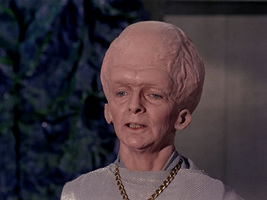
 "The Cage"
"The Cage"